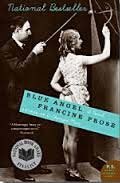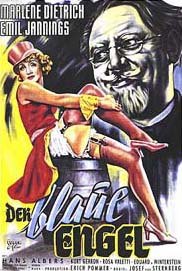Francine Prose's Blue Angel -- Narcissism Run Amok

When a professor in this novel quotes the first line of a Philip Larkin poem, "Your mum and dad, they fuck you up," I had a viscerally negative reaction, only magnified when looking up the work in which the poet slanders his parents and grandparents, enjoins humanity against having children which they are bound to torture and ruin, and invites the entire wretched lot to commit suicide. "Your mum and dad fucked you up, Phil", I screamed, "that's clear enough". I've found that screaming at the written word is generally a sign that you do indeed have art in your hands, a thought applying doubly to Francine Prose's Blue Angel.
The reader thinks little when Madame Bovary is mentioned in passing early on; after all, Swenson is an English professor in his element. The canonical works still provide a common coin, his department's nasty little deconstructionist notwithstanding. Only gradually does it dawn that our man is Emma Bovary, except without the courage or slightest excuse for his bad behavior.
Swenson is 47, a poor tortured creative writing teacher these twenty years, subjected in the line of duty to the vilest trash, wonderfully evoked in the opening scene. Two decently reviewed novels to his credit, suffering from ennui and writer's block, our hero is blessed with a sexy, beautiful wife, whom he's never cheated on, all temptations manfully resisted down through the years. Sherrie's a great cook too, and we're going to hear all about it because (apparently) Francine Prose has been criticized for writing too much about food in earlier novels.
Swenson's blocked on his new novel, a knock off of The Red and the Black with black anti-hero Julius Sorley, artfully titled The Black and the Black. The few tidbits we see are not promising. Enter Angela Argo, a multiply pierced, leather-jacketed, dog-collared, punk student previously mute in Swenson's undergraduate creative writing seminar, mercifully not named Juliana. Stendhal's story of untrammeled ambition is one of her favorites, for reasons that become clear as the drama unfolds.
Angela is a fine writer, as Swenson (and a reader of Blue Angel) sees immediately. Unfortunately, the theme of her first-person novel centers around a high school teacher's affair with / rape of the narrator. There are signs it might have happened to Angela; she's perhaps been a phone sex worker (Angela 911) and definitely been the proud author of a book of incest and rape poems of that name. But maybe not — there are fine scenes in the classroom where Swenson patiently explains the meaning of the term "fiction" in spite of his own apparent inability to move beyond his early autobiographical hit. Can it be that Angela is already a more consummate professional than her teacher, at least at this point in their respective careers? Her start is uncannily like his — first revenge novel followed by memoir.

Swenson jokes about incipient Alzheimer's and his short periods of lost focus in the classroom, but half way through his behavior becomes so mindless that the reader starts to wonder if there mightn't be a chemical explanation, lacking which, attention goes to whether a little Larkinesque smoke is sufficient motivation for what we're seeing. As the little sadists in seminar might say, "A guy wouldn't do that." Even the term "narcissistic personality" isn't quite adequate — presumably such a person would take elementary precautions to protect a very cozy way of life. But there are those troubling hints of a man about to go haywire — perhaps he is working through that childhood script on a deferred schedule. Could his undeniable failure as a writer, his recent estrangement from his daughter who has just left for another college, be factors? His first novel after all, also called Blue Angel, reprised the Marlene Dietrich movie of the same name, circa 1930, where "another pitiful self-abasing slob", a German Herr Professor, throws away his life in an insane sexual obsession. Aristotle said you can never call yourself happy or your life a success until you're in the grave.
I found myself increasingly hostile to this man as he destroys his own and others' lives. How about just doing your job, professor? One reason for banning teacher-student sex is that it prevents both parties from doing their jobs properly. Swenson fails them all, particularly Angela, and it won't do to excuse him because he's the vulnerable one and Angela is the aggressive grasping harridan in Prose's well-handled role reversal. So Angela is not a very nice person. So what? Swenson is a privileged professor and is paid well to help her and all his other students (whose parents pay $28,000 a year for their children to attend this pathetic rustic college, ~$38,000 in 2015 dollars) become better writers. And he's in charge in the classroom. You don't like being a professor? Fine, drive truck. Be as bad a driver as professor and your comrades will make the Faculty-Student Women's Alliance look temperate (trust me, as Carlos from seminar would say).
Angela is more than a match for the ineffectual professor — she's driven and cares about nothing but writing and making a career out it. In their one and only fiasco of a liaison, Swenson leaves her stark naked at the computer, eager to get on with real business. "Better than sex", she once allows, retracting only to better lure her quarry.
By the time of the hearing at the end, I'd given up on Swenson, so enjoyed watching Dean, librarian, colleagues, and students administer an exquisite, slow motion roasting where every single peccadillo is brought to light — sneaking Angela's dirty poems out of the library, the animal sex stories in seminar, the works, some of it made up, some of it true, as long as it puts him in the worst possible light. Swenson hoped for a higher vindication (like Anna Karenina, a thought that actually passes through the dolt's mind), but even the lies buy him no sympathy. Emma Bovary at least had the excuse of few spiritual or intellectual resources to counter the romantic trash that turned her head as a girl. Swenson, raised a Quaker and heir to Tolstoy's transcendent art, vandalizes his heritage searching vainly for self-justification. As does the whole novel, the scene proceeds from his point of view, with odd bits of gallows humor: "... no one in the room can believe that a normal, healthy male would hit on Angela Argo when there was a woman like Claris [another seminar student] around. Clearly, she is lying, or else Swenson is insane. Shouldn't an insanity defense be permitted in sexual harassment cases?" On and on it goes until the multi-talented Angela, actress as well as writer, dressed now as Jane College with parents as witness, finishes him off by complaining that he didn't hold up his end of the deal, sex for access to his editor, announcing as she does that said editor has given her a contract for the book anyway. The Faculty-Student Women's Alliance gives her a fitting sendoff: "... if women are ever going to receive an equal education, these problems have to be addressed and dealt with, so that we can protect and empower ourselves." "Sure," Angela says. "You're welcome. Whatever."
Prose invokes the forgiving and always tolerant Chekhov, fugue-like, at several critical junctures. As always, Chekhov was there first with "a certain Honored Professor Nikolai Stepanovich", the dying old medical professor in A Dull Story who, even as he loses his faculties, has the strength to express his undying love for the University and its traditions and above all, for his students. I will never understand how a twenty-nine year old man (Chekhov's age when he wrote this story) captured the exquisite drama and excitement of a technical lecture well delivered. Even Chekhov, the magnanimous chronicler of broken teamsters who talk to their horses because no one else will listen, of women who must have someone to love and care for, would lose patience with this self-important loser.
Mike Bertrand
April 13, 2001